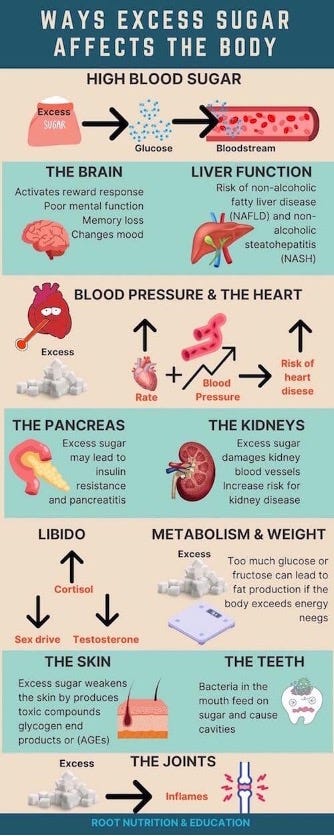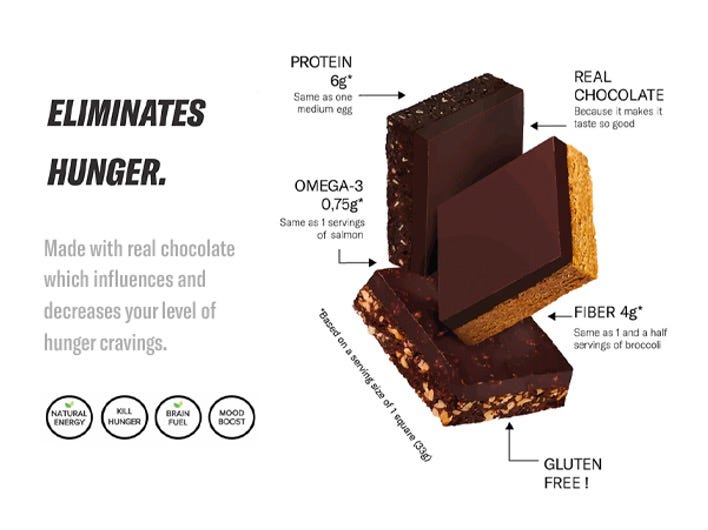So Sugar is Bad? How Added Sugar Quickly Became the Enemy
Exploring the sudden rise of the low/no sugar movement and the impact of added sugars on American's metabolic health.
When growing up, we all heard our parents warn about sugar crashes after we stuck our hands in the cookie jar one too many times. In the past, we sought to be mindful of sugar crashes and were instructed to eat our veggies before diving into dessert, but more recently the topic of sugar, specifically added sugar, has become increasingly more controversial. There are popular sugar detox diets, consumer companies selling continuous glucose monitors, and thousands of social media influencers preaching the dangers of sugar consumption. As a self-proclaimed sugar addict, I wanted to dive into the science behind these claims as well as provide some context around why there’s such hype around the topic.
To begin, it’s important to understand what sugar actually is and how it affects our bodies at a molecular level. Sugar is a simple carbohydrate, primarily composed of glucose and fructose, that provides energy to cells throughout the body. When consumed, sugar is broken down into glucose, which cells use as a primary energy source. However, excessive sugar intake can lead to several cellular and metabolic issues. For instance, high levels of fructose are metabolized in the liver, where they can contribute to the buildup of fat, leading to conditions like non-alcoholic fatty liver disease. Moreover, excessive sugar consumption can cause an overload in the pancreas' ability to manage insulin, potentially leading to insulin resistance, a precursor to Type 2 diabetes. Additionally, sugar can increase cellular aging and affect cognitive functions by impacting memory and learning due to its effect on brain glucose levels.
What’s important to understand is that not all sugar is “bad” sugar. Natural sugars, commonly found in foods such as fruit and milk come with additional nutrients such as fiber, vitamins, and minerals and are typically metabolized more slowly, which helps with blood sugar levels. Added sugars are sugars incorporated into foods during processing for flavor enhancement or preservation. Common examples include soda, candy, and sweetened dairy products. These types of sugars are the ones linked to several negative health effects and are to be limited in one’s diet.
The American Heart Association recommends no more than 6 teaspoons (25 grams) of added sugar per day for women and 9 teaspoons (36 grams) for men to mitigate these health risks. The average American consumes more than 17 teaspoons of added sugar a day, nearly double the recommended amount. Excess sugar intake increases risk of obesity, cardiovascular disease, and other health problems that are linked to diabetes. From 2001 to 2021, diabetes prevalence significantly increased among Americans with over 38 million people or 11.6% of the US population diagnosed with the disease. Furthermore, almost 100 million Americans are pre-diabetic, almost 1 in 3 individuals. See my previous newsletter on GLP-1s for more information about obesity and diabetes rates in the US.
There are a number of negative effects sugar has on the human body:
The immediate and direct effects range from weight gain and tooth decay to increased triglycerides which contributes to the thickening of arterial walls.
The long-term and chronic conditions are much more severe. The most obvious consequence is an increase in insulin resistance, which increases blood glucose and ultimately can lead to the development of Type 2 diabetes. Heart disease is another deadly disease that can be increased by excess sugar consumption due to the increase in triglycerides. Excessive sugar intake can also lead to higher blood pressure from arterial inflammation and increased prevalence of liver disease as sugar increases the buildup of fat in the liver. The rise of cases of non-alcoholic fatty liver disease have spurred academia to conduct research into the causes and begin to publicly highlight the dangers of excess added sugar. Sugar consumption can also cause increased inflammation in the joints leading to pain and in some instances development of arthritis. Maybe the most concerning consequence is the increased risk of cognitive decline and dementia.
Beyond physical repercussions, there are several psychological and neurological impacts that excess sugar intake can cause such as addiction, given sugar stimulates dopamine release, similar to other addictive substances, along with mood disorders and therefore higher risk of depression and anxiety.
For many years, fat was the villain when it came to our diets, but recently sugar has taken center stage causing both the consumer and Big Food quite the headache (both literally and figuratively). Up until recently, sugar had skated by relatively unscathed in popular culture. Large food companies were adding sugar to just about everything on the shelves. There was a brief moment where high fructose corn syrup (HFCS) got quite a bit of heat, but other than that, there hadn’t been a widespread societal push to decrease sugar intake across the country. In fact, in the 60s the sugar industry actually funded research that downplayed the risks of sugar and highlighted hazards of fat in order to insulate the industry from consumer wrath.
This manipulation of research continued to persist decades later when in 2015, when “the New York Times obtained emails revealing Coca-Cola's cozy relationships with sponsored researchers who were conducting studies aimed at minimizing the effects of sugary drinks on obesity. Even more recently, the Associated Press obtained emails showing how a candy trade association funded and influenced studies to show that children who eat sweets have healthier body weights than those who do not.” Up until recently, relatively little was done to curb our dependance on sugar. Nowadays we are beginning to see local, state, and federal legislation working to reduce sugar intake in schools, ban sugary drinks in hospitals and medical centers, and new guidelines from the CDC on added sugar intake across all age demographics.
Sugar has quickly become public enemy number 1. The massive amounts of data now have access to through increased scientific research, metabolic health companies, and consumer hardware tools have allowed us to take a peek inside what sugar is doing to our overall health and wellness. As I mentioned earlier, HFCS has been the target of many attacks on sugar in the past, but in reality, it doesn’t matter if it’s cane sugar or HFCS, consensus tells us too much sugar is a bad thing. Increased awareness on the lack of nutritional value in sugar, public awareness and media surrounding it’s negative health effects, ongoing scientific research, and government and health organizational regulation and guidelines have begun to demonize the substance.
As rates of obesity and heart disease have risen across the country, there has been an increased focus on heart and metabolic health. Companies like Omada Health and Virta Health have created chronic care platforms for those struggling with these diseases to help manage, treat, and prevent many of the common diseases and side effects. While a number of successful nutrition platforms such as Noom and Nourish aim to provide access to dietitians, behavioral health coaching, and personalized nutrition plans to those looking to lose weight, boost metabolism, and live an overall healthier life.
From a consumer lens, companies like Levels Health have allowed consumers to track in real time, through the use of continuous glucose monitors, the effects of various foods on our blood glucose and in turn, help us regulate and optimize our metabolisms. Tracking biomarkers related to our metabolism has become increasingly popular, giving rise to other hardware platforms such as Lumen. The company uses a CO2 sensor and flow meter to determine carbon dioxide concentration in your breath, which indicates whether your body is burning carbs or fat, helping build out personalized daily nutritional plans to optimize your metabolism.
Even the CPG world has picked up on this anti-sugar trend with a seemingly endless stream of new food and beverage companies marketing low or no sugar alternatives to our favorite consumable products. Smart Sweets has dominated the low sugar candy market, while Midday Squares offers functional chocolate squares that satisfy sweet cravings without the crazy glucose spike. The sparkling soda company Olipop has brought us nostalgic beverage flavors like root beer and vintage cola but with a reduced sugar content and added gut health benefits through the addition of fiber to their products.
The demonization of sugar in society is supported by substantial evidence from various health studies and organizational guidelines. While natural sugars in fruits and dairy are generally not harmful when consumed as part of a balanced diet, added sugars in processed foods are most concerning due to their association with numerous health risks and their prevalence in the modern diet. This has led to widespread advocacy for reduced sugar consumption and stricter labeling laws to help consumers make better-informed dietary choices.
While having a Hostess Twinkie every once in a while, won’t kill you, it’s important to be cognizant of how much sugar we are consuming on a daily basis, not only for our long-term physical health, but for our mental health and the overall health of our society as Americans. It is important to acknowledge the role excessive sugar consumption plays in worsening public health outcomes. As consumers, being aware of the high prevalence of added sugars in processed foods and their health implications is crucial for making healthier dietary choices. The emphasis on monitoring added sugar intake is reinforced by changes to food labeling regulations, which now require clearer identification of added sugars on packaged foods. This move aims to help consumers make more informed decisions and reduce the high intake levels that are typical in the American diet. Awareness and education on this topic are vital as excessive consumption of added sugars continues to be a widespread issue with significant health ramifications.









Great info👏🏻👏🏻👏🏻
Great piece Jessie!